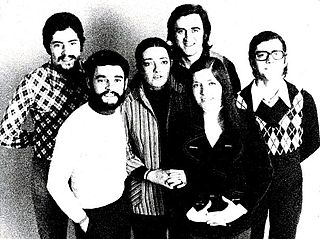Banghra is a Spanish pop group formed in 2007 with members Javi Mota, Lidia Guevara, and Victoria Gómez that tried to reintroduce belly dancing and Indian dance music to the mainstream in catchy songs sung in Spanish and English. The band was formed as a project of producer Sergio Medrano. The group disbanded in 2008 after just 2 albums in 2 years, namely La Danza del Vientre and ...a bailar! and a number of successful singles, the biggest of which was "My Own Way". After split up of Banghra, Javi Mota and Lidia Guevara have both pursued solo music careers.

Timbiriche is a Mexican pop music group. The group started as a children's group in 1981 and managed to evolve successfully into adulthood.

María de los Ángeles Felisa Santamaría Espinosa, professionally known as Massiel, is a Spanish pop singer. She won the Eurovision Song Contest 1968 with the song "La, la, la", beating the British pop singer Cliff Richard's "Congratulations".

Paloma Cecilia San Basilio Martínez, known as Paloma San Basilio, is a Spanish singer, songwriter, producer and actress. She was awarded with a Latin Grammy Lifetime Achievement Award for contributions to Latin music. She has sold millions of records throughout her career, with styles that range from melodic songs to pop. She often appeared in various musicals such as the Spanish-language premiere production of Andrew Lloyd Webber's Evita in Madrid. Some other musical theater works include Man of La Mancha, My Fair Lady, Victor/Victoria, and Sunset Boulevard.
Mexican pop is a music genre produced in Mexico, particularly intended for teenagers and young adults.

Mocedades is a Spanish singing group from the Basque Country, who represented Spain in the Eurovision Song Contest in 1973 with the hit song "Eres Tú". Since June 2014, Mocedades has been the name of two bands: one with Izaskun Uranga as its leader and the other with Javier Garay. A third group, El Consorcio, is composed of former Mocedades members who left the group but have continued a career together outside the Mocedades brand.

"Tu te reconnaîtras", sung in French by French singer Anne-Marie David representing Luxembourg, was the winning song at the Eurovision Song Contest 1973 – the first time a country won the contest two years in succession without sharing the victory, as Spain in 1969. Vicky Leandros had won the 1972 contest for Luxembourg with "Après toi" and the 1973 edition was consequently held in the Luxembourgish capital. Performed eleventh on the night – after Italy's Massimo Ranieri with "Chi sarà con te" and before Sweden's Nova with "You're Summer" – it was awarded a total of 129 points, placing it first in a field of 17.

Gisela Lladó Cánovas, known mononymously as Gisela, is a Spanish pop singer and voice actress. She was born in El Bruc (Barcelona), in Catalonia, Spain and studied journalism at the Autonomous University of Barcelona before becoming famous after placing eighth in the first Spanish edition of Operación Triunfo in 2001. She is also known for representing Andorra in the Eurovision Song Contest 2008 in Belgrade, Serbia.

Ainhoa Cantalapiedra Cuñado is a popular Spanish singer and songwriter.
Estíbaliz Uranga Amézaga is a Spanish singer, best known as a member of the folk group Mocedades, as part of the duo Sergio y Estíbaliz and nowadays as a member of the group El Consorcio.

Izaskun Uranga Amézaga is a Spanish musician, who with her two sisters Estibaliz Uranga and Amaya Uranga formed the group "Las Hermanas Urangas", which became "Voces y Guitarras" and, in 1969, the well-known Spanish folk group Mocedades.

"Eres tú" is a popular Spanish language song written in 1973 by Juan Carlos Calderón and performed by the Spanish band Mocedades, with Amaya Uranga performing the lead vocal.
Evangelina Sobredo Galanes, known as Cecilia, was a Spanish singer-songwriter. She took her stage name from the song "Cecilia" by Simon and Garfunkel.
Yuridia Valenzuela Canseco, commonly known as Yuri, is a Mexican singer, actress and television host. Yuri began her career as a teenage singer in her native country. In 1978 she released her first album titled Tú Iluminas mi Vida. She gained recognition as a result of her participation in the Oti Festival in 1980. In the 1980s and early 1990s, Yuri established herself as one of the most popular pop music singers in Mexico and Latin America. Her vocal quality and versatility allow her to be incorporated into other musical genres, ranging from pop to dance, ranchera and tropical music genres. Thanks to her success and influence, she came to be considered the "Queen of Latin Pop".
"Fuiste un Trozo de Hielo en la Escarcha" is a ballad originally written by José María Cano for the female singer Amaya Uranga's debut solo studio album Volver, released in 1986.
Sergio and Estíbaliz were a Spanish vocal duo, formed by Sergio Blanco Rivas and Estíbaliz Uranga Amézaga who also worked with groups Mocedades and El Consorcio. They were also known for their participation in the Eurovision Song Contest 1975. Both were born in Bilbao.
Uranga is a surname. Notable people with the surname include:
Amaya is a female given name and surname of Spanish origins, derived from the village of Amaya and its neighboring mountain in Castile and León, Spain. The name of the village, in turn, has Indo-European roots and means "am (ma)" or "mother". The suffix io-ia is also used to form action names or toponyms, implying that the meaning of Amaya or Amaia is "mother city", as it will be called later, "the capital". Other hypothesis is that the name derived from the Proto-Basque or Basque word Amaia, meaning "the end". Variations include Amaia, Amayah, Ammaya, and Amya.

Spain and its OTI member station RTVE was one of the founding members of the OTI Festival and debuted in the event in 1972 in Madrid, being the host broadcaster of the first show. The Spanish participation in the song contest was almost uninterrupted, in fact, RTVE only withdrew from the contest in the edition of 1986, which was held in Santiago, as a protest against the Augusto Pinochet dictatorship.

El Consorcio is a Spanish singing group from Bilbao, formed in 1993 by singers Amaya, Estíbaliz and Iñaki Uranga, Carlos Zubiaga and Sergio Blanco, all of them past members of the singing group Mocedades. In 2016 they received the Latin Grammy Lifetime Achievement Award.










